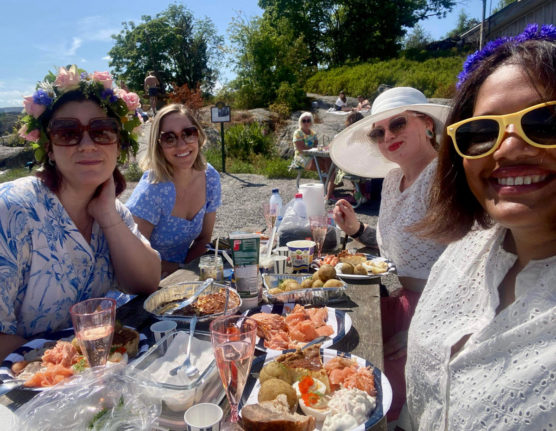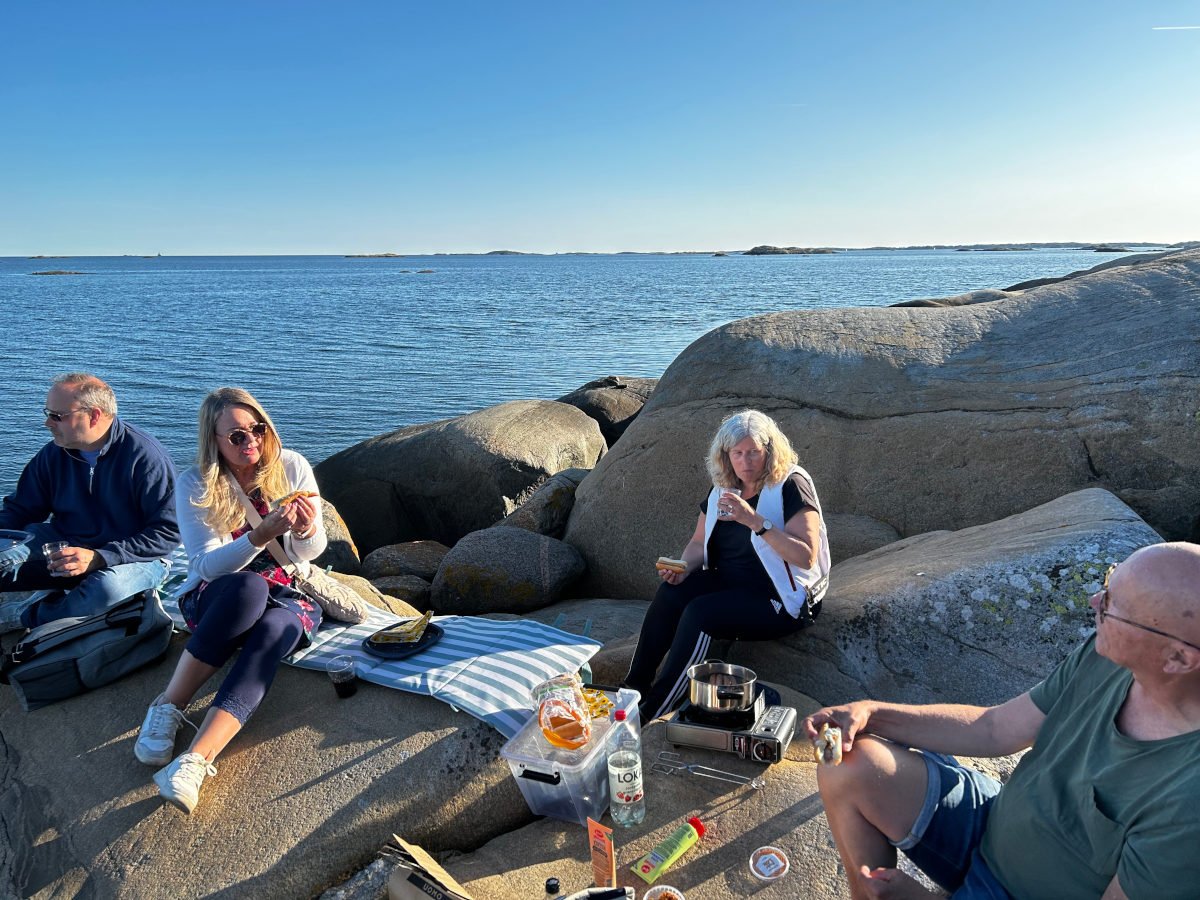“My first reaction to this question is, what restrictions? From the moment I arrived in Sweden, in August from my home in California, I was shocked that no one in Malmö where I am staying wears masks or practises distancing,” said Robin, a reader from the US.
“We are extremely careful in northern California, even with 80 percent vaccination rate. We never go inside someone’s home, a store, or ride in a car without a mask. I have been back and forth to Denmark several times, including when I crossed into Sweden after arriving at CPH, and never encountered any Covid checkpoints. Covid protocols seem symbolic at best (a neglected bottle of alcohol here and there, a few plexi barriers). For a time I wore a mask inside stores but I was usually the only one. I soon concluded there was no point, as wearing a mask is to protect others. I now put trust in my Moderna vaccine and pray I don’t get Covid while I am in Sweden,” said Robin.
William, an Irish engineer, was another of our readers who felt the remaining restrictions were lax. “From a public health perspective it feels premature [to remove the rules on events and restaurants], but the restrictions here were so tame that I don’t think it will make much of a difference to people’s behaviour. During the pandemic I rarely saw masks or social distancing,” he commented.
“Having come from a country with much more restrictions [than Sweden] I feel lucky to be able to move around as much as I am already. Lifting restrictions further seems premature and unnecessary given the economy seems to be doing OK, all things considered,” a reader from the Philippines, who asked to remain anonymous, told the survey.
Mia, a reader from Spain, wrote: “In Sweden, specially the youth population, has lived a very unreal approach to this traumatic event. My Swedish neighbour told me ‘It’s horrible what’s happening in your country; we’re very lucky Sweden has chosen not to act so dramatically’. As if Covid wasn’t hitting Sweden alike.”
The rules being removed from September 29th include limits on numbers of attendees permitted at public events (currently set at 300 for indoor seated events and 3,000 for outdoor seated events) as well as all restrictions for restaurants (such as a limit of eight people per group, and one-metre minimum distance between groups). Sweden was one of few countries not to use mask-wearing as a significant component in its strategy, but did recommend their use on public transport during weekday rush hour between January and the start of July.
A reader who asked to remain anonymous said they felt exhilarated, saying: “I will have the possibility to return to the office, enjoy public gatherings, bars and shows. It feels like we are seeing the light at the end on a too long tunnel.”
And Jeremie, originally from France, wrote of the changes: “It’s about time! About 80 percent of the population [over the age of 16] vaccinated, hardly any deaths anymore, only cases… what are we trying to prevent? We will probably never know exactly, but I am curious to know how much long-term damage the restrictions for the past year and a half will have done… It might be bigger than the damage from Covid-19 itself. I am not talking about Sweden in particular, which had some of the lightest restrictions.”
When we asked our readers how the changes would affect their day-to-day life, the most commonly mentioned change was a return to the workplace full-time, with one reader saying the lifting of restrictions left her scared of “infection from colleagues”. Since spring 2020, a recommendation has been in place for workers who can do so to work from home as much as possible, though this has not been legally enforced. This recommendation will also be lifted from September 29th.
Of those who were feeling anxious about the change, several raised concerns about having large events without a requirement for a negative Covid-19 test or vaccine pass.
“If they implemented a vaccine pass to some of these events, it might work, but a crowded venue or stadium is hardly a good idea right now. Just because we all want the pandemic to be over, doesn’t mean it is,” noted Andrea, from Canada.
“I would feel better about it if there were some kind of safety measures in terms of rapid testing or showing a vaccination certificate to enter events or restaurants, like other countries, eg Germany are doing,” added a student in Uppsala who asked to be anonymous. She was concerned that without this precaution, cases could spread quickly, including due to unvaccinated groups and children.
“Even if they do not end up in hospital they can develop long Covid, which I think is not taken into account enough in this decision. Personally, even though I am fully vaccinated I still wear a mask in all shops and also when sitting in class at university (where I am the only one doing so),” she added.
She was one of several readers who mentioned concern over current and potential future variants of the virus. “I feel concerned regarding new variants like Delta, but I guess it is like [Swedish state epidemiologist, Anders] Tegnell said once: we need to learn how to live with this disease,” another reader, a Brazilian developer, said.
Meanwhile, several of our readers pointed out that while most restrictions will be lifted in autumn, one key area has remained strictly regulated throughout the pandemic: travel. While Swedish citizens and residents can travel to and from the country with no requirement for isolation, people from many non-EU countries are banned from entry.
“The government should look into allowing those who are fully vaccinated into Sweden. A lot of people’s family members especially from outside the EU cannot visit because even though they are vaccinated they are banned from entry, yet people from Sweden can go there,” said British reader Rachel.
The Local’s survey was not scientific, but we received responses from people from a range of ages, nationalities, locations in Sweden and professions. We closed our survey when we reached 70 responses and the quotes included in this article were chosen as representative. Thanks to everyone who took the time to respond. Even if we did not include your comment, your response helps guide our future reporting.





 Please whitelist us to continue reading.
Please whitelist us to continue reading.
I am a little bit disappointed with this compilation of opinions as it contains many sceptical and critical opionions but but hardly any greatful and optimistic ones. I wrote a very positive statement which was not included and wonder if other positive statements were ignored on purpose too so that the article rather reflects the optionion of the author and editor and not the majority of people asked.
And there is something like a proof for this: just look at how many people willingly wear masks in if they are not mandated: hardly anyone. Therefore I believe that the vast majority strongly appreciates re-opening steps that are clearly justified through low numbers in hospitalization and deaths.
This news site has slowly evolved into a sort of political action committee.
Hi Markus,
We can’t include every comment we receive on our surveys due to volume, but we do make sure that the comments included in articles accurately represent the range of comments we received overall. We also made the survey paywall-free to aim to reach as wide a range of people as possible.
Usually we include at least one compulsory multiple choice question in each survey so we can give a summary of the overall breakdown of views (see paragraphs 2-3 in this article: https://www.thelocal.se/20201204/readers-reveal-how-do-swedens-international-residents-feel-about-the-coronavirus-response/), but unfortunately that didn’t work this time (we used a new survey tool) so we couldn’t include this type of breakdown.
As the article notes, it’s not a scientific survey. It’s possible that people who have stronger feelings might feel more motivated to fill out the survey, for example.
I hope that addresses your concerns and helps explain how we work with reader surveys.
All content of this article come from only the people who scare from this imaginary virus 🦠 and they can’t see what damages these unnecessary restrictions will have to our children and many generation to come. If we don’t stop all this nonsense we will end up in a very difficult situation. Please read the real statistics and facts and don’t follow and listen to media who is run by devil minded elites.
Are the deaths imaginary too?
https://youtu.be/V_g3CwEbQtU
Perhaps you have to watch this if you haven’t yet.
Good advice.
I am surprised it’s not yet censored on youtube. They mostly delete the videos with the critical voices.